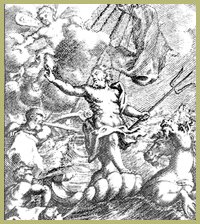Idomeneo...explained.
Idomeneo is generally classified as opera seria (as contrasted with opera buffa), a form characterized by heroic emotion and dramatic purpose. Bursting with Mozart's abundant musical gifts, the work offers arias and ensemble pieces which explore the unhappy conflicts in which the characters find themselves.
First performed in 1781, Idomeneo reflects the operatic conventions of the time. To some extent Mozart stretched those conventions, reaching for a more flowing dramatic line, but, nonetheless, the basic structure of the opera is a rather static series of set pieces. The emotion and drama are ever present in the music and the singing; today's audiences, with a bit of adjustment to the form, are richly rewarded.
Idomeneo, the king of Crete, returning victorious from war with Troy, encounters a storm that threatens his fleet. In return for safe passage, he vows to Neptune to sacrifice to him the first person that he sees upon arriving ashore. When that person turns out to be his son, Idamante, Idomeneo sends Idamante away, hoping to avoid his pledge to Neptune.
Idamante and a Trojan prisoner, the princess Ilia, are in love. Idamante is also loved by Elettra, herself a princess in exile. Of course, breaking a vow to a god will have repercussions: Neptune sends a monster to ravish Crete. Idamante slays the monster and offers himself as the promised sacrifice to Neptune, as, indeed, does Ilia, but an oracle intervenes and everyone lives happily ever after.
The plot, somewhat hard to buy into for contemporary audiences, is less important in and of itself than as a setup for the conflicts and the emotional positions of each of the principals, providing the platform for musical expression of a variety of powerful feelings. Early on, for example, Ilia, in her first aria, laments the loss of her father and brother in the war, confesses to loving Idamante, and expresses the anguished conflict of loving the conqueror who holds her prisoner and has cost her her family. Elettra, suffering from an ultimate case of unrequited love, asks, "Must the daughter of a king see this prisoner aspire....?"
Idomeneo sings of the conflict between his love for his son and his need to protect his son from the consequences of his vow to Neptune.









2 comments:
sounds a lot like abraham and isaac... sounds a lot like the sane one's dream... these archetypal themes repeat themselves throughout relegion, mythology, and art and are alive and well in the collective subconscious
just proving carl jung's theory of "collective unconsciouness"
Post a Comment